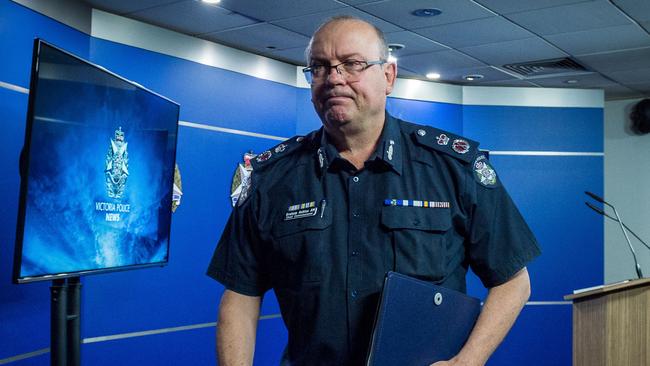Victoria Police royal commission: Tony Mokbel’s cook spilt the beans
The story of Tony Mokbel’s amphetamine cook and Lawyer X is at the heart of Victoria’s royal commission.

Within the blood-soaked history of Melbourne’s gangland war, he never fired a shot nor ordered a hit. His was never a household name; no one would remember him from the Underbelly series.
Yet, when it came to making speed, the drug that fuelled so much of the murder and lawlessness of that time, he could cook like no one else. He wasn’t just a cook, he was the cook, Tony Mokbel’s cook.
To understand the story of Lawyer X, an extraordinary scandal that has plunged the Victoria Police and judiciary into crisis and forced the Andrews government to establish a royal commission into the potentially corrupt use of police informants, it is best to start with Cookie. Lawyer X was Cookie’s lawyer. She was also his friend, or so he thought. She applied for him to get bail, she babysat his kids. She helped organise his 40th birthday party.
He became obsessed with her. One day, while working at one of Mokbel’s suburban meth labs, he described in explicit terms what he wanted to do to her, unaware he was being recorded by a hidden listening device. Perhaps blinded by his obsession, he told her things he never should have about his drug dealings and associates. He was also blind to the fact she was passing on this information to police. He never suspected his own lawyer was conspiring with police to set him up.
Within the gang-busting Purana Taskforce, Lawyer X was known as registered human source 3838. She was first registered as a police informant in 2005 but, by her own admission, she had been providing information to police since the taskforce was formed in 2004 to bring to an end the gangland war.
She was a volatile, socially gregarious and highly talented barrister who enjoyed the company of crooks and cops. She understood how the system worked. She knew how to cut deals for her clients and, apparently, was prepared to throw others under a bus. For police trying to break apart this treacherous sub-culture, she was the ultimate double agent. She is also at the centre of an episode which, in the judgment of the High Court, has “debased fundamental premises of the criminal justice system’’.
In a fateful moment in September 2005, Cookie told Lawyer X about an address in Coburg, in Melbourne’s north, where he and other members of The Company, Mokbel’s cartel, were manufacturing drugs. Lawyer X told police the location of the lab. In the raids that followed, Cookie was arrested and charged. The first person he called was Lawyer X. She went to the St Kilda Road Police Complex, where the Purana Taskforce was housed, and talked at length to her client. That same day, she told her police handlers Cookie had agreed to rat on other members of The Company. He would eventually stand as a star witness against Mokbel, another client of Lawyer X.
Cookie’s co-operation was essential to bringing down The Company and securing a 30-year prison term against Mokbel, the Purana Taskforce’s most celebrated scalp. A further six Mokbel associates, including Cookie, were convicted. The High Court has now found those convictions were corrupted by what Lawyer X did and what senior figures in Victoria Police encouraged her to do.
Why would any defence lawyer betray her own clients? In secret testimony provided to the Victorian Supreme Court in February last year, Lawyer X said she feared being charged with being an accessory to crimes if she did not provide information to police. She later contradicted this testimony under cross-examination, saying her sole motivation was to rid her life of the cartel and get the “Mokbel monkey’’ off her back.
In earlier correspondence with police, Lawyer X claimed to be acting for altruistic reasons. In a 2015 letter to Victoria Police assistant commissioner Steve Fontana, Lawyer X described her frustration at the failure of police to collar those responsible for massive drug operations, murders, bashings and money-laundering. She denied receiving payment for information or being threatened with criminal prosecution by police.
In the same letter, she claims 386 people were arrested on information she provided. The list includes: Mokbel’s brothers Horty and Milad; the central figures in a conspiracy to import 4.4 tonnes of ecstasy pills in tomato tins, Pasquale Barbaro, Robert Karam and John Higgs; Carlton Crew identity Mick Gatto; Victor Pierce’s assassin Frank Orman; and another gangland killer who in turn became a supergrass witness and cannot be identified.
Two of those figures, Tony Mokbel and Karam, have already taken steps to challenge their convictions on the basis of Lawyer X’s secret life as an informer. Lawyers for Mokbel have lodged a freedom of information request with the Office of Public Prosecutions for any documents that refer to her as a police informant. Karam has initiated appeal proceedings.
Within police and Melbourne’s criminal networks, not everyone trusted Lawyer X. Carl Williams liked her and talked to her regularly but, as the walls closed in around him and trusted allies began disappearing into witness protection, he warned Tony Mokbel that Lawyer X might be playing both sides of the street. At police headquarters, at least one detective was willing to call out the arrangement with Lawyer X for what it was.
In 2009, the most expensive investigation in Victoria Police history was on the brink of collapse. The Briars taskforce had been established two years earlier to investigate the links between the killing of Shane Chartres Abbott, a male prostitute who claimed to be a 200-year-old vampire, and corrupt police. Despite an exhaustive investigation involving a hugely expensive surveillance operation, taskforce detectives had been unable to corroborate critical evidence of the star witness — a murderer and perjurer who, like Lawyer X, had become a police informant.
In a desperate decision, deputy police commissioner Simon Overland requested the lead investigator, experienced homicide detective Ron Iddles, take a statement from Lawyer X about who was at a certain pub on a particular night. Iddles refused and issued what now stands as a prophetic warning. “I rang back to the office here and said ‘do you realise what you are asking me to do?’’’ Iddles told The Australian in 2014. “I said you’d better tell Simon this is a bad, bad move.’’
Iddles believes that if Lawyer X had become a witness in the case, Briars would have triggered a royal commission. Lawyer X was also prescient on this point. She was convinced she would be killed if she was ever exposed as a police informant.
“If this gets out, say nice things at my eulogy, because I will be gone,” she told her police handlers at one point. “And enjoy the royal commission.’’
Now that a royal commission is being established, it is likely to delve beyond the activities of registered human source 3838 and into one of the darkest corners of the gangland war: the way in which murderers, rapists, violent career criminals and inveterate liars were offered preferential treatment, financial inducements, heavily reduced sentences and lifelong protection from public scrutiny to provide select evidence to secure convictions.
Some convicted gangland killers have served their time and are back in the community due to the generous agreements they struck with the police and OPP. Where a properly conducted royal commission might end and who it might ensnare are impossible to predict.
Lawyer X’s unethical conduct and the Victoria Police decision to use her as a registered informant have already been examined by an Independent Broad-Based Anti-Corruption Commission investigation conducted by retired Supreme Court judge Murray Kellam QC, a separate review by former police chief commissioner Neil Comrie, Victorian Supreme Court judge Timothy Ginnane, three judges of the Court of Appeal and seven of the High Court.
There remains, however, a long list of people who haven’t yet explained what they knew about Lawyer X and why they didn’t put a stop to an arrangement with the potential to compromise the entire criminal justice system. Police chief commissioners Christine Nixon and Overland are at the top of that list, along with prosecutors who agreed to run cases built on information reports she provided to police.
One of them is the lawyer who has battled for two years against Victoria Police in the courts to bring the Lawyer X scandal to light: former director of public prosecutions John Champion SC. His successor, Kerri Judd, yesterday wrote to 20 crooks informing them their defence barrister, Lawyer X, was a police informant who might have provided information against their interests. One of them is a member of The Company who, in 2011, was convicted of trafficking a commercial quantity of methamphetamine and sentenced to a minimum of nine years in jail. He cannot be identified for legal reasons.
Three years ago, this drug trafficker wrote a letter to Kellam expressing concern that his conviction might be unsafe. In the letter, he raised the prospect that Champion should not be involved in reviewing his case because he prosecuted it. The letter goes on to describe how Cookie, a prosecution witness whose identity is still protected by court orders, massaged his testimony to police over nearly 40 separate statements. “He and others were coached by police in what to say,’’ the criminal wrote. “(Cookie) would give one version of events in one proceeding against an accused and a different version of events against another accused in a different hearing. His evidence was akin to ordering updated versions of computer software.’’
This phenomenon — constantly shifting evidence from compromised, gangland witnesses — runs like a virus through the transcripts of the major drug and murder cases which followed the end of gangland war.
The star witness of the royal commission will be Lawyer X. Her relationship with police soured in 2009. Since then she has refused to enter police protection and become locked in a bitter dispute over how police handled her and failed to conceal her identity as a registered informant. In a 2014 letter to chief commissioner Ken Lay, she made clear her distress at public disclosures about her secret role, led by the Herald Sun. “I am not prepared to entrust everything personal to me and my children as well as our privacy, safety and wellbeing to the very organisation that promised and assured me that my assistance over a number of years would always remain confidential, yet failed so appallingly in protecting my status and, indeed, has put my life as well as the life of my children at risk.’’
In a 2010 text message to a friend, Lawyer X was more blunt: “I’m looking forward to cross-examining Simon and his band of dishonest, perjuring clowns. They’ve picked the wrong person to f. k over, that much I promise.’’
For all the help that Lawyer X provided police over many years, they can expect none from her.


